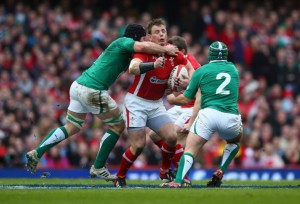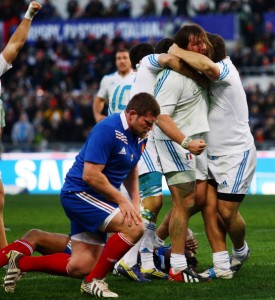
No pass master: Outside centre Jonathan Davies awaits a pass during Welsh training at the Vale Resort
By Alan Dymock
Round 2 of the Six Nations is almost upon us. After a rip-roaring first weekend, there are three more tantalising fixtures. Scotland take on Italy, a fired-up France will clash with a wounded-Wales, before on Sunday, a confident England will take on a resurgent Ireland in Dublin. We look at a few talking points ahead of the action…
Can’t pass, won’t pass
After a less than accurate passing display from Jonathan Davies against Ireland last Saturday, the Scarlets’ skills coach Mark Jones said that the bullocking outside centre was “not a natural passer”.
Short on confidence and in dire need of some soothing balm for his stinging pride, Davies will not have been helped by the frank appraisal. Particularly as it will have come after days of agonisingly analysing his two passes into touch. However, Davies is not the only centre who will be in focus this weekend.
Lining up opposite Wales’ ‘baby rhino’ is a resurgent Mathieu Bastareaud, a man who would rather declare himself early for a high speed collision than lie to his body, trying to convince it that putting the ball through his hands is an option. Saturday at the Stade de France could be all about the big bang at 13 with the survivors around the centres deciding the score.
As well as this, Manu Tuilagi will have to make do with banging from the bench after Billy Twelvetrees’ impressive bow. However, England’s chunky centre is going to have to work pretty hard to command the spotlight again, should he be given some game time alongside the Gloucester man.
Choking Up
Much has been made of the Irish choke tackle and how the men in green ever so aggressively coerce opposition ball carriers into involuntary mauls. Nevertheless, it must be pointed out that Wales were all choked up due to running high and direct and painfully flat to bear-like back rowers and the Heineken Cup’s most prolific turnover thief, Rory Best.
If England are to avoid making the same mistakes as Wales did in their first half against Ireland they need to avoid playing too narrow and too flat and they need to be prepared to trust the few hard-nosed players already at the ruck, without asking them to claw for ball.
More prevalent than the choke, though, is Ireland’s grabbing and twisting of men over the ball. England need to stay strong when they bend to get over a fallen man and they need to use auxiliary ruckers better than Wales did, holding off the judo-style clearers with more steel.
Improving Italy
With almost every Frenchman spotted hands on head, quizzical look on the face and backsides smarting from an Italian spanking on Sunday, the rest of the rugby world seemed to yelp with delight.
This was not billed as the collapse of France, nor was it the freak result that people always feared would pop up. According to a smattering of experts this was Italy showing how much their rugby had improved. At the very least the result sent a warning to all the other Six Nations sides, many of whom thanked them for the display and cleared a wee spot at the top table.
For Scotland this is a concern. Italy have an in-form fly-half for the first time, well, since Diego Dominguez and their powerful back rows and pack grafters appear to be at their grizzly best. Will this be the first time in 14 seasons that Italy build something meaningful, or can Scotland tough it out?
Murrayfield could be the location where we see Italy finally fitting the bill and that must be a concern for the masses in attendance.







